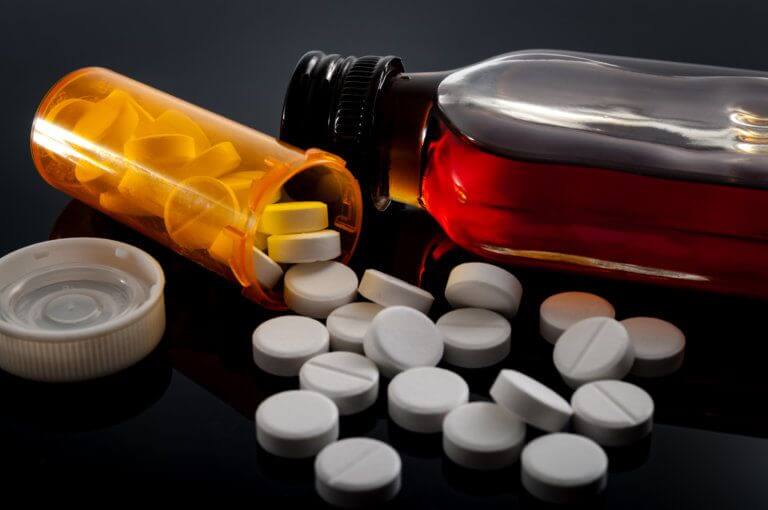Alcohol And Opioids: A Deadly Combination

Mixing Alcohol And Opioids
Prescription painkillers are some of the most commonly abused substances in the US, and opioids are the most commonly abused prescription painkillers. The effects that opioids have on the body as a central nervous system depressants or “downer,” is strikingly similar to that of alcohol. An increasing number of Americans are using alcohol and opioids in tandem, often with fatal results.
The Rise Of The Opioid Epidemic
Starting in the late 1990s, doctors began prescribing record-high numbers of opioids after being assured by pharmaceutical companies that they weren’t addictive. The result was an epidemic of opioid overdose addictions and deaths. In 2015, more than 2 million Americans suffered from opioid addiction and 33,000 died from overdose. State prescription drug monitoring programs have since cut down on the number of prescriptions but have yet to reverse the rate of opioid dependencies or fatalities.
In fact, as it has become harder and harder to acquire prescription opioids, more and more of those suffering from opioid addiction have switched to cheaper, more readily available, and chemically-similar heroin. Tragically, heroin is also more dangerous and deadly, especially when it is mixed with other drugs. Communities across the country have also seen a rise in the popularity of fentanyl, a synthetic analgesic that is up to 100 times stronger than morphine. Fentanyl is sometimes used in surgery, but it is also manufactured and distributed illegally on the street. Even worse, carfentanil, which is up to 10,000 times stronger than morphine and fatal in quantities as small as 7 grains, has also contributed to a a growing number of overdose deaths.
Common prescription opioids include:
| Generic Name | Brand Name |
| Propoxyphene | Darvocet® |
| Meperidine | Demerol® |
| Oxycodone | Percocet®, OxyContin® |
| Hydrocodone | Vicodin® |
| Hydromorphone | Dilaudid® |
Every day, 115 people fatally overdose using opioids, and an increasing number of those deaths involve alcohol.

Need Addiction Support?
Reach out to a treatment provider today! Calls are always free and confidential.
What happens When You Mix Alcohol And Opioids?
Though alcohol and opioids have a similar effect on the body, opioids are much stronger than alcohol. Separately, both slow the respiratory system, reducing the amount of oxygen circulating the body and getting to the brain. This combination is often much greater than the effect of either alcohol or opioids on their own, putting a much greater strain on the body and putting the user in much greater danger of overdose and death.
Mixing opioids and alchol can cause:
- Drowsiness
- Dizziness
- Difficulty breathing
- Impaired muscle control
- Unusual behavior
- Memory problems
- Increased risk of overdose
In a recent study, the American Society of Anesthesiologists found that taking even one oxycodone tablet with a small amount of alcohol sharply increases the risk of respiratory depression. Breathing can become extremely shallow or stop completely. The study found that elderly people are at an even greater risk due to an inability to recover fast enough.
A person’s lips or fingertips may become blue (from lack of oxygen), they may make gurgling sounds, and they may also be unresponsive. These common signs of overdose mean that you should contact emergency medical services immediately.
“Unfortunately, we’re seeing more fatalities and people in emergency rooms after having misused or abused legally prescribed opioids, like oxycodone, while having consumed alcohol,” said Albert Dahan, M.D., Ph.D., study author, professor of anesthesiology and head of the Anesthesia and Pain Research Unit at Leiden University Medical Center, Leiden, the Netherlands.
“We hope to increase awareness regarding the dangers of prescription opioids, the increased danger of the simultaneous use of opioids and alcohol, and that elderly people are at an even greater increased risk of this potentially life-threatening side effect. Ultimately, people should know that it is never a good idea to drink alcohol with opioids.”
If you or a loved one is taking any prescription opioids, consider keeping a naloxone kit on hand. Naloxone (also known by the brand name Narcan) can reverse opioid overdoses and allow an individual to continue breathing.
Withdrawal And Detox From Alcohol And Opioids
Heavy drinkers who stop suddenly may experience severe symptoms of withdrawal, while opioid users may experience withdrawal symptoms similar to those of heroin withdrawal. Withdrawal from both substances can be life-threatening and typically requires medical attention and assistance (usually in a detox facility).
Withdrawal from alcohol and opioids can include:
- Nausea and vomiting
- Depression
- Sweating and shaking
- High blood pressure
- Anxiety
- Seizures
- Death in severe cases
For individuals trying to recover from the co-abuse of substances like alcohol and opioids, finding treatment that targets both addictions is essential. Recent data shows that alcohol abstinence treatment was ineffective for mixed opioid and alcohol addiction sufferers. Moreover, methadone — a common addiction treatment medication for heroin detox — treatment patients, and opioid addiction sufferers in general, have exhibited significantly high rates of alcoholism.
While clearly dangerous, the relationship between alcoholism and opioid abuse is multifaceted and complex. Resolving these addictions can take time and patience. It’s never too late to begin the work of recovery.
Contact a treatment provider today for more information on rehab facilities and recovery options.
